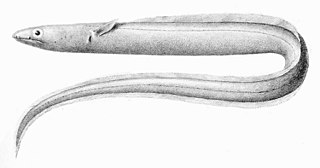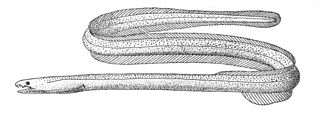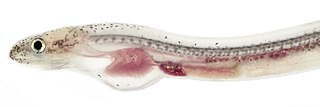
Ophichthidae is a family of fish in the order Anguilliformes, commonly known as the snake eels. The term "Ophichthidae" comes from Greek ophis ("serpent") and ichthys ("fish"). Snake eels are also burrowing eels. They are named for their physical appearance, as they have long, cylindrical, snake-like bodies. This family is found worldwide in tropical to warm temperate waters. They inhabit a wide range of habitats, from coastal shallows and even rivers, to depths below 800 m (2,600 ft). Most species are bottom dwellers, hiding in mud or sand to capture their prey of crustaceans and small fish, but some are pelagic.

Gymnothorax is a genus of fish in the family Muraenidae found in Atlantic, Indian, and Pacific Oceans. With more than 120 species, it the most speciose genus of moray eels.

Chlopsis is a genus of eels of the family Chlopsidae.

Apterichtus is a genus of fish in the family Ophichthidae. Many of its species are called finless eels.

Echelus is a genus of eels in the snake-eel family Ophichthidae.

Muraenichthys is a genus of eels in the snake eel family Ophichthidae.

Myrophis is a genus of eels in the snake eel family Ophichthidae.

Ophichthus is a genus of eels in the snake eel family Ophichthidae.

Scolecenchelys is a genus of eels in the snake eel family Ophichthidae.
Skythrenchelys is a genus of eels in the snake eel family Ophichthidae.
Skythrenchelys macrostoma, also known as the large-mouth angry worm eel, is a species of eel in the family Ophichthidae. It is a marine, tropical eel which is known from the Indo-Pacific Ocean, including Red Sea.
Muraenichthys malabonensis is a species of eel in the family Ophichthidae.
Neenchelys cheni is an eel in the family Ophichthidae. It was described by Johnson T. F. Chen and Herman Ting-Chen Weng in 1967, originally under the genus Myrophis. It is a marine, temperate water-dwelling eel which is known from Taiwan, in the northwestern Pacific Ocean. Males can reach a maximum standard length of 35 centimetres (14 in).
McCosker's worm eel is a species of fish in the worm eel family Ophichthidae. It was first described by Yusuke Hibino, Ho Hsuan-Ching, and Seishi Kimura in 2012. It is a marine, deep water-dwelling eel which is known from the northwestern Pacific Ocean, including Taiwan and Japan. It dwells at a depth range of 100 to 400 metres, and leads a benthic lifestyle; it is collected by bottom trawlers. Males can reach a maximum total length of 52.2 centimetres (20.6 in).
The dark throat worm eel is a species of eel in the family Ophichthidae. It was first described by Yusuke Hibino, Yoshiaki Kai, and Seishi Kimura in 2013. It is a marine, temperate water-dwelling eel which is known from Japan, in the northwestern Pacific Ocean. It dwells at a depth range of 90–147 metres. Males can reach a maximum total length of 26.5 centimetres.

Myrophinae, the worm eels, is a subfamily of ray-finned fishes belonging to the family Ophichthidae, which also includes the snake eels in the subfamily Ophichthinae.
John Edward McCosker is an American ichthyologist and as has been part of expeditions to many countries such as Antarctic, Australia, and the Galapagos. After extensive study and ten expeditions he is one of the foremost experts on the Galapagos. He has been featured in various different television documentaries as well as working with filmmakers and other documentary programs off screen.
The Taiwanese worm eel is a species of ophichthid fish found in Taiwan. This species is only known from northeastern and southwestern Taiwan. This species is the only member of the genus Sympenchelys.
Ophichthus bicolor, the bicolored snake eel, is an eel in the family Ophichthidae, found around Taiwan. This species reaches a length of 92.7 cm (36.5 in).
Ophichthus shaoi, the long-bodied snake eel, is an eel in the family Ophichthidae. It is found around Taiwan. This species reaches a length of 62.3 cm (24.5 in).









